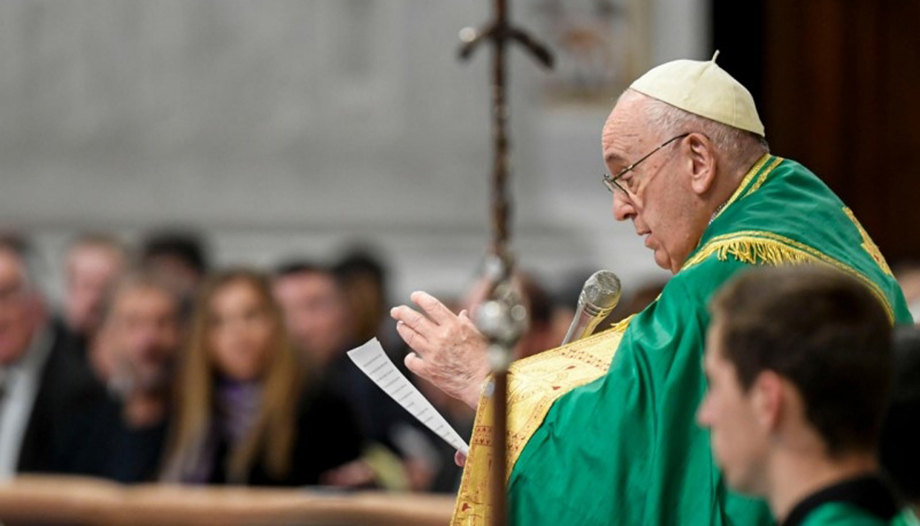In the face of dramatic events, situations of pain, wars, revolutions and calamities, the Christian's outlook is nourished by faith. So, then, do not adopt catastrophic and superstitious attitudes, or even defeatist and conspiratorial ones, certain that "being close to God 'not a hair of one's head will be lost'".
These are the words with which Pope Francis began his commentary on the liturgy in the Mass of the VI World Day of the Poor, celebrated in St. Peter's Basilica on Sunday, November 13 in the presence of numerous categories of "excluded", as has been the custom since 2017, when he himself instituted it at the end of the Jubilee of Mercy.
In the face of pandemics and wars, such as those we are experiencing, we must not "allow ourselves to be paralyzed by fear or give in to defeatism," the Pontiff explained in his homily, falling into a lax attitude of resignation. Rather, the Christian is the one who precisely in the most difficult situations "gets up", looks up and starts again, because "his God is the God of resurrection and hope".
To give concreteness
Here, then, is where the concreteness of one's actions comes in, as the Pope also wrote in the Message dedicated to this Day: do not let others "do something" to solve the world's problems, but get your hands dirty in the first person. In short, seizing the opportunity to do "the possible good, that little good that is possible to do, and to build even from negative situations".
It is also a way of growing and maturing precisely in faith, abandoning a fearful disinterest in the facts of the world, "the way of worldliness," but taking advantage of these opportunities as a way of "bearing witness to the Gospel" without wasting the meaning of one's own existence.
Listen to
Days like these serve, therefore - Pope Francis reiterated in his homily - "to break that inner deafness that we all have" and that makes us indifferent to the "stifled cry of pain of the weakest".
Rather - and the Pope could not fail to make repeated reference to the war in Ukraine and the unspeakable suffering inflicted on the population, but also to the situation of those who migrate because of the environmental crisis or the lack of work - it is necessary to listen to these feeble pleas for help and learn "to weep with them and for them, to see how much loneliness and anguish are hidden even in the forgotten corners of our cities," and that is where we must go.
Let us distance ourselves, then, from so many deceivers and doomsayers, and learn to bear witness, lighting "lights of hope in the midst of darkness" and building a more fraternal, just, lawful and peaceful world: "let us not flee to defend ourselves from history, but let us fight to give another face to the history in which we live".
The strength comes from the Lord, from recognizing that as a Father he is at our side and watches over us, and we too must be "fathers" of the discarded.
Charitable initiatives
As is customary, in the week leading up to the World Day of the PoorIn the world, numerous initiatives of "mercy" for the poor and the least of the poor, coordinated by the Dicastery for Evangelization, are being carried out all over the world.
In particular, after two years of suspension due to the pandemic, the Health Presidium was reestablished in St. Peter's Square to offer medical examinations and medicines to disadvantaged people, who thus have a place to go free of charge.
For his part, Pope Francis supported the parishes of Rome with tons of food that was distributed to families in the area with more than 5,000 boxes of basic foodstuffs such as pasta, rice, flour, sugar, oil and milk.
Another intervention was to alleviate the consequences of the energy crisis that has led to rising utility bills; the Catholic community took over the payment of gas and electricity bills for families in difficulty.
As in the past, after the Holy Mass in St. Peter's, lunch was served to some 1,300 poor people in the Paul VI Hall of the Vatican.
"Shelter"
Also within the framework of the Day dedicated to the Poor, last Wednesday, at the end of the General Audience, Pope Francis blessed in St. Peter's Square a new sculpture by the Canadian artist Timothy Schmalz, "Shelter", which aims to raise awareness about homelessness. The work, in fact, shows the life-size figure of a homeless person sheltered by a blanket pulled by a pigeon in flight. It was donated to the Vincentian Family, which is carrying out the "13 Homes Campaign" around the world to provide housing for all those (some 1.2 billion people) who live in extreme and precarious situations, in makeshift places that cannot be called home.
Among other things, Schmalz is the author of the work 'Angels Without Knowing' on the plight of refugees, which has been permanently installed under Bernini's columns since 2019.







